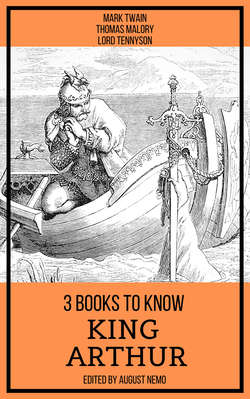Читать книгу 3 books to know King Arthur - Thomas Malory, ReadOn Classics, Charles Dudley Warner - Страница 20
На сайте Литреса книга снята с продажи.
ОглавлениеCHAPTER XI
OF THE BIRTH OF SIR TRISTRAM
––––––––
IN THE DAYS OF ARTHUR, there ruled over the kingdom of Liones the good knight Sir Meliodas; and his Queen was the fair Elizabeth, sister of King Mark of Cornwall.
Now there was a lady, an enchantress, who had no good-will towards King Meliodas and his Queen; so one day, when the King was hunting, she brought it to pass by her charms that Meliodas chased a hart till he found himself, far from all his men, alone by an old castle, and there he was taken prisoner by the lady's knights.
When King Meliodas did not return home, the Queen was nigh crazed with grief. Attended only by one of the ladies of her court, she ran out into the forest to seek her lord. Long and far she wandered, until she could go no further, but sank down at the foot of a great tree, and there, in the midst of the forest, was her little son born. When the Queen knew that she must die, she kissed the babe and said: "Ah! little son, sad has been thy birth, wherefore thy name shall be Tristram; but thou shalt grow to be a brave knight and a strong." Then she charged her gentlewoman to take care of the child and to commend her to King Meliodas; and after that she died. All too late came many of the barons seeking their Queen, and sorrowfully they bore her back to the castle where presently the King arrived, released by the skill of Merlin from the evil spells of the enchantress. Great indeed was his grief for the death of his Queen. He caused her to be buried with all the pomp and reverence due to so good and fair a lady, and long and bitterly he mourned her loss and all the people with him.
But at the end of seven years, King Meliodas took another wife. Then, when the Queen had sons of her own, it angered her to think that in the days to come, her stepson Tristram, and none other, should rule the fair land of Liones. The more she thought of it, the more she hated him till, at the last, she was resolved to do away with him. So she filled a silver goblet with a pleasant drink in which she had mixed poison, and she set it in the room where Tristram played with the young princes, his half-brothers. Now the day was hot, and presently, being heated with his play, the young prince, the Queen's eldest son, drank of the poisoned goblet; and immediately he died. Much the Queen grieved, but more than ever she hated her stepson Tristram, as if, through him, her son had died. Presently, again she mixed poison and set it in a goblet; and that time, King Meliodas, returning thirsty from the chase, took the cup and would have drunk of it, only the Queen cried to him to forbear. Then the King recalled to mind how his young son had drunk of a seeming pleasant drink and died on the instant; and seizing the Queen by the hand, he cried: "False traitress! tell me at once what is in that cup, or I will slay thee!" Then the Queen cried him mercy and told him all her sin. But in his wrath the King would have no mercy, but sentenced her to be burnt at the stake, which, in those days, was the doom of traitors. The day having come when the Queen should suffer for her fault, she was led out and bound to a stake in the presence of all the court, and the faggots were heaped about her. Then the young prince Tristram kneeled before the King and asked of him a favour: and the King, loving him much, granted him his request. "Then," said Tristram, "I require you to release the Queen, my stepmother, and to take her again to your favour." Greatly the King marvelled, and said: "Ye should of right hate her, seeing that she sought your life." But Tristram answered: "I forgive her freely." "I give you then her life," said the King; "do ye release her from the stake." So Tristram unloosed the chains which bound the Queen and led her back to the castle, and from that day the Queen loved him well; but as for King Meliodas, though he forgave her and suffered her to remain at court, yet never again would he have aught to do with her.
